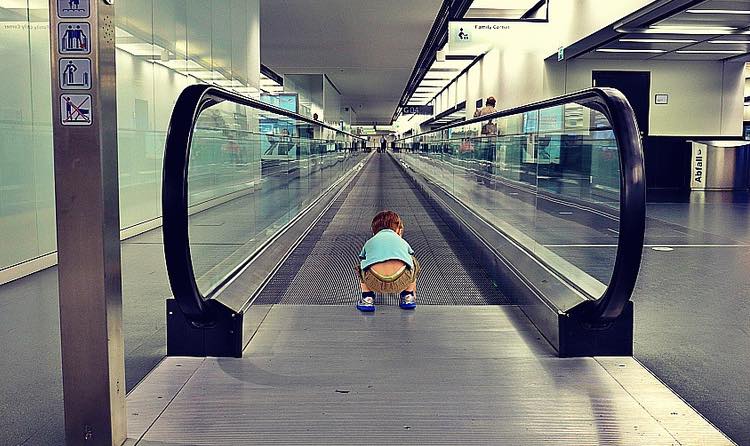Parents of children with special needs do an amazing job of juggling many different factors while keeping calm and providing their children with amazing care. But there are always tasks and experiences that can wear you down and nowhere is that more true than while navigating the ins and outs of air travel. For parents of children with special needs, hopping on that flight to see grandma for Christmas can be especially taxing. If you’re traveling with a child with special needs this holiday season, here are a few tips:
Enlist Some Help
Airports can be noisy and crowded, which can lead to anxious behaviors in some children with special needs. So mapping out your route through the airport will save you much time and stress when travel day arrives.
 NEED A HAPPIER NEWS FEED?….GET OUR GOOD NEWS APP—> Download FREE for Android and iOS
NEED A HAPPIER NEWS FEED?….GET OUR GOOD NEWS APP—> Download FREE for Android and iOS
You might also consider asking a relative or friend to obtain a security pass so that they can provide an extra set of helping hands to either get you and your family to your gate or to assist you when you arrive at your destination. Just be sure to tell them to bring their government-issued ID as they’ll need it to obtain the pass and go through security.
If possible, try to book only direct flights. Delays are frequent during the holidays so you might risk missing your connecting flight or being stuck at the connecting airport for hours, which won’t make anyone happy.
Know the TSA Procedures
The Transportation Security Administration (TSA) is the organization responsible for screening all airline passengers. In the wake of 9/11 and subsequent threats to public safety, restrictions for travelers have become increasingly strict.
CHECK Out: Autism-Friendly Clothing Dumps Zips, Buttons and Tags, Offers GPS
For example, if your child is on the autism spectrum or has a cognitive disability, let the TSA agent know so that they can work with you on the best way to move your child through security. If your child uses a mobility aid or wheelchair, they will not have to leave the device during screening. If you have specific questions or concerns, call the TSA Cares hotline 72 hours before your departure. Agents on the hotline will be able to help you prepare for the trip. It’s also a good idea to call ahead to clarify with your airline and the airport that you’ll be able to get through security without a major hassle.
Make Arrangements for Special Accommodations in Advance
With limitations on carry-on luggage, arriving on board prepared with everything you may need to maintain your child’s comfort level in-flight may require some creativity or pre-arrangements with the airline. Obviously, airlines must accommodate equipment such as oxygen and wheelchairs. However, many special needs children are on special diets or have special comfort items that you may have difficulty bringing on-board in your carry-on luggage.
RELATED: My Son With Autism Had Trouble In School Until One Teacher Did This
For example, there’s no guarantee that a sufficient meal or snack will be provided on the plane. If your child has certain dietary restrictions, such as being gluten-free, bring those snacks with you. Thankfully, many kinds of foods can be brought through security as long as they’re properly packaged. And if your child requires medication or has equipment that requires batteries or charging equipment, check with airport security beforehand to find out the best way to bring those items on-board with you. In fact, it’s always a good idea to talk out the specifics with the airline ahead of time so that you don’t have to argue your case five minutes before departure.
Consider an Airport Rehearsal
An airport rehearsal might sound like a lot of added work, but being able to walk through the process you’ll be required to go through on the day of your departure can help you identify other items you may need, such as a beloved blanket from home or noise-canceling headphones, or arrangements that could be made to make the experience as pleasant as possible for your child and the rest of your family.
LOOK: New Muppet Brings Autism Awareness to Sesame Street
Additionally, an airport rehearsal can help you gauge how your child is likely to react to various situations that may arise, so you can formulate the best coping mechanisms while time is on your side rather than in the heat of a meltdown.
Arrive Early
The more time you can allow your family to get through airport security and to your departure gate, the better. Even the best-laid, pre-arranged plans can fail due to a simple lapse in communication between customer service and the airline staff working that day. When you’re early, you’ll have the time you need to make adjustments, which will help you stay cool, calm, and collected. Our kids can certainly pick up on our anxiety so when you’re able to relax and enjoy the ride, so to speak, everyone will be happier.
MORE: Mom Starts Dog Treat Business So Special Needs Adults Can Bake for Bucks
Know the Law When It Comes to Service Dogs
If your child uses a service dog, they’re absolutely allowed in the cabin with your child. The Air Carrier Access Act sets out the requirements that airlines must follow. Make sure you’re familiar with it before your travel date.
For example, if requested by you, it states that the airline should provide a bulkhead seat, and if, for some reason, your child’s seat can’t accommodate the service animal, the airline is required to try to reseat them in the plane before moving the animal to checked baggage. If your child’s dog isn’t a trained service animal and you’ll be leaving him behind while you travel, take your child with you to visit the kennel or pet sitter where the pet will be staying so that they’ll know their four-legged friend will be safe.
Above all, treating your travel experience like its own adventure can make it less stressful for you, your child, and the rest of your family or travel companions. Commit to going with the flow and have confidence in your abilities as a parent to effectively advocate for your child’s needs, and give yourself ample time to do so should the need arise.
(Learn More at Jet With Kids)
Lindsay M writes for PublicHealthCorps and, in her spare time, enjoys satisfying her other passions – like cooking, biking and photography. She is happily married to her high school sweetheart and the mother of twin girls.
Photo by Roberto Trombetta, CC




















